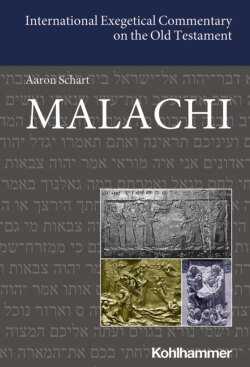Читать книгу Malachi - Aaron Schart - Страница 15
На сайте Литреса книга снята с продажи.
Primary stratum
ОглавлениеPrimary stratum The transmission of the Malachi document began with the collection and publication of six disputation speeches stemming from a single author. This primary stratum would probably have consisted of the text as follows: Mal 1:2–3; 1:6, 7b, 9b, 10b, 13aα–14a; 2:9a; 2:10, 11a*, 11b, 12a, 14–15, 16a*, 16b; 2:17–3:1a, 5; 3:6, 8–12; 3:13–15, 18, 19* [4:1* ET], 20a* [4:2a* ET], 20b [4:2b ET].20
Oral stratum The question whether the earliest literary stratum is based on orally transmitted arguments is occasionally answered in the negative,21 but two arguments commend affirming oral disputations. First, there must have been a reason why the author developed a variant of the genre “disputation sequence” at all. What is the point of creating a literary simulation of a vivid disputation if the readers were utterly unfamiliar with anything of the sort? Second, the quotations of the opponents (quite extensive for a prophetic context), no matter how much they have been reformulated and polemically skewed by the prophet, do express real contrary positions. It makes no sense to suppose that an author would have taken the trouble, after the fact, to shape his convictions in a form that makes room for the opponents’ independent utterances, then leaving it to the readers to judge whether those opponents have been convincingly refuted.
The oral disputations, to the extent they touched on cultic matters, may have taken place within the milieu of the temple and the priesthood. Moral and socio-ethical questions could have been debated in the public assembly in Jerusalem (cf., e.g., Ezra 10:8–9; Neh 5:13; 8:1–2; 8:13; 9:1; 13:1, 11).
Reworkings of the independent Malachi document The Malachi document was redactionally revised while it was still an independent work. In particular the second disputation speech was edited in such a way that a critique originally directed at the laity was now applied to the priests and Levites. That editing is also connected with the addition in Mal 2:12b–13, which refers to an unacceptable weeping and groaning during service at the altar, and with the insertion of Mal 3:3–4, which expects a purification of the Levitical priesthood.
The “word of God” formula The Malachi document uses the formula אמר יהוה צבאות, ’āmar Yhwh ṣǝbā’ôt, “says Yhwh of hosts” twenty times.22 The high number of occurrences are in themselves striking: the repetition is completely unmotivated and seems to provide exaggerated emphasis. This formula in particular is used to show that the disputation speeches are the direct word of God. The formula is inserted in very different ways: In Mal 1:8, for example, it provides a very solemn and emphatic assertion of guilt. It is also appropriate as reinforcement for an accusation or the announcement of punishment inasmuch as it points out that it is up to Yhwh—and not to human beings—to carry out the declarations of punishment. But in most cases the formula is superfluous because the context clearly identifies Yhwh as the speaker. The formula is out of place in passages that simply attest to a factual situation (Mal 1:9b; 1:11b, 12a; 1:13aα). Likewise, the formula is altogether disruptive when it is placed in the middle of the caesura of a bicolon (Mal 1:10b; 1:11b, 12a; 1:14b). One passage in which the ’āmar Yhwh ṣǝbā’ôt formula is completely out of place is Mal 1:13, a discourse explicitly marked as a quotation of the opponents, so that the speech is additionally and falsely marked as the word of Yhwh.
“What a weariness this is,” you say, and you sniff at me, says the Lord of hosts.
The simplest explanation is that in these cases the formulae were secondarily inserted. Only in Mal 1:6bα3 is the formula such a necessary syntactical component of the sentence that it can scarcely be excluded from the oldest stratum.
The multiple insertions of the formula probably occurred because the genre of the disputation speech provides an unusually large space for the words of the opponents. When the counter-questions of the opponents are inserted as quotations the readers themselves can judge whether the prophet’s arguments are persuasive. In order to debase any doubts about the prophet’s arguments the redactors frequently refer to their divine origin.
